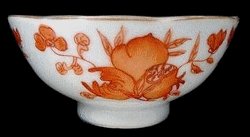Buying Antique Porcelain
Watch out when buying antique porcelain!
| Beware of provenance information when buying antique porcelain! |
When buying Chinese porcelain you will always come in contact with the thorny issue of provenance!
|
The much beloved practice of mentioning provenance in antique dealer circles is of little real value, except in rare cases.
|
Provenance may give a false sense of security (authenticity) when buying antique ceramics
or antiques in general.
Even at estate sales when items may come from
highly regarded antiques collections you cannot be sure that all Chinese
porcelain is authentic.
The previous owners may have added many different items. not in their specialty field, to their
collection over the years. The owners may not have had the necessary
expertise to verify authenticity of all pieces .
 |
Red decoration typical for the |
Antique
dealers who have really no intention to deceive customers in the first
place may use provenance to show how legitimate an item is. This is more
likely if they are not expert at identifying Chinese porcelain. It
covers for their inability to judge...
Tips for antique porcelain buying
Buy from people who know their wares, but don't rely on their judgement, rely on yours!
Even dealers admit to occasionally buying fake Chinese porcelain by
mistake. They will often try to resell it to compensate for their loss.
Only with your own independent knowledge can you positively
avoid problems like the above. Study all related points and learn to
judge yourself whether a piece of porcelain is a true antique. :-)

Buying antique porcelain in China
Do some research und you will find that buying authentic antiques in China is difficult, and legally exporting
them is often impossible. Don't deceive yourself. You cannot get better
or cheaper antiques directly in China because China generally is
"cheap". China is strictly protecting its ancient cultural objects and
artifacts.
As a collector/buyer of Chinese antiques you should know that China
currently prohibits the export of antique items over 100 years old. This
is especially true for high-class porcelain from private kilns and all
from official kilns.
According to more recent information it now seems that even the export
of old-looking items of less age than that may be restricted, possibly
because some antiques that are "younger" than 100 years were made the
same way and look the same as older ones.
If you are buying
online, either Ebay or otherwise, you need to be especially careful of
who sells Chinese antiques. Obviously, there is a high risk that antique
items dispatched from China are reproductions or fakes due to the
reasons stated above.
|
Domestic trading of a certain type of ceramics from the Tang dynasty has also been forbidden for a while. Better forget it... you won't be able to get a real one of these directly from China, not legally.
|
The
only thing you may be sure of when buying at a Wenwuguan is that these
items are allowed to be exported legally. Mostly either because they are
plenty, of comparatively low quality, or they are otherwise of little
interest in regard to preserving Chinese heritage.
See China export restrictions.
Porcelain age signs
International trading practices you must know
Fake antique porcelain
Beginner's Porcelain Buying Tips
Buying Antiques Online
 everything with a wax seal is a genuine antique. The seal is no confirmation that an antique item is authentic, it means only that the item was inspected and is allowed to be exported. Even newer items may have these seals. In addition, wax seals on items purchased elsewhere than those stores could be fake.
everything with a wax seal is a genuine antique. The seal is no confirmation that an antique item is authentic, it means only that the item was inspected and is allowed to be exported. Even newer items may have these seals. In addition, wax seals on items purchased elsewhere than those stores could be fake.
